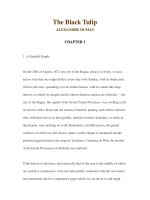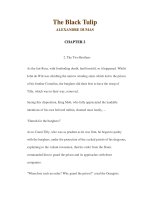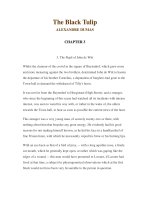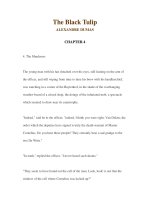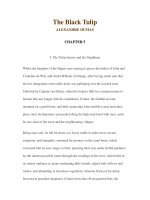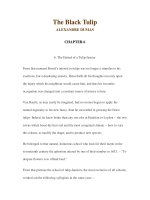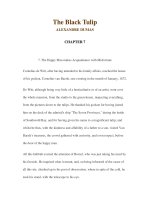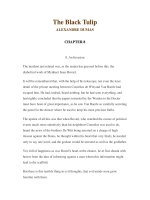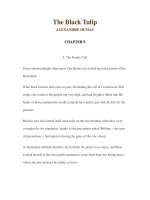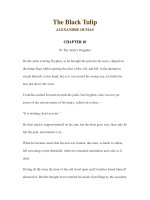LUYỆN ĐỌC TIẾNG ANH QUA CÁC TÁC PHẨM VĂN HỌC –The Black Tulip ALEXANDRE DUMAS CHAPTER 7 ppt
Bạn đang xem bản rút gọn của tài liệu. Xem và tải ngay bản đầy đủ của tài liệu tại đây (38.32 KB, 17 trang )
The Black Tulip
ALEXANDRE DUMAS
CHAPTER 7
7. The Happy Man makes Acquaintance with Misfortune
Cornelius de Witt, after having attended to his family affairs, reached the house
of his godson, Cornelius van Baerle, one evening in the month of January, 1672.
De Witt, although being very little of a horticulturist or of an artist, went over
the whole mansion, from the studio to the green-house, inspecting everything,
from the pictures down to the tulips. He thanked his godson for having joined
him on the deck of the admiral's ship "The Seven Provinces," during the battle
of Southwold Bay, and for having given his name to a magnificent tulip; and
whilst he thus, with the kindness and affability of a father to a son, visited Van
Baerle's treasures, the crowd gathered with curiosity, and even respect, before
the door of the happy man.
All this hubbub excited the attention of Boxtel, who was just taking his meal by
his fireside. He inquired what it meant, and, on being informed of the cause of
all this stir, climbed up to his post of observation, where in spite of the cold, he
took his stand, with the telescope to his eye.
This telescope had not been of great service to him since the autumn of 1671.
The tulips, like true daughters of the East, averse to cold, do not abide in the
open ground in winter. They need the shelter of the house, the soft bed on the
shelves, and the congenial warmth of the stove. Van Baerle, therefore, passed
the whole winter in his laboratory, in the midst of his books and pictures. He
went only rarely to the room where he kept his bulbs, unless it were to allow
some occasional rays of the sun to enter, by opening one of the movable sashes
of the glass front.
On the evening of which we are speaking, after the two Corneliuses had visited
together all the apartments of the house, whilst a train of domestics followed
their steps, De Witt said in a low voice to Van Baerle,
"My dear son, send these people away, and let us be alone for some minutes."
The younger Cornelius, bowing assent, said aloud,
"Would you now, sir, please to see my dry-room?"
The dry-room, this pantheon, this sanctum sanctorum of the tulip-fancier, was,
as Delphi of old, interdicted to the profane uninitiated.
Never had any of his servants been bold enough to set his foot there. Cornelius
admitted only the inoffensive broom of an old Frisian housekeeper, who had
been his nurse, and who from the time when he had devoted himself to the
culture of tulips ventured no longer to put onions in his stews, for fear of pulling
to pieces and mincing the idol of her foster child.
At the mere mention of the dry-room, therefore, the servants who were carrying
the lights respectfully fell back. Cornelius, taking the candlestick from the hands
of the foremost, conducted his godfather into that room, which was no other
than that very cabinet with a glass front into which Boxtel was continually
prying with his telescope.
The envious spy was watching more intently than ever.
First of all he saw the walls and windows lit up.
Then two dark figures appeared.
One of them, tall, majestic, stern, sat down near the table on which Van Baerle
had placed the taper.
In this figure, Boxtel recognised the pale features of Cornelius de Witt, whose
long hair, parted in front, fell over his shoulders.
De Witt, after having said some few words to Cornelius, the meaning of which
the prying neighbour could not read in the movement of his lips, took from his
breast pocket a white parcel, carefully sealed, which Boxtel, judging from the
manner in which Cornelius received it, and placed it in one of the presses,
supposed to contain papers of the greatest importance.
His first thought was that this precious deposit enclosed some newly imported
bulbs from Bengal or Ceylon; but he soon reflected that Cornelius de Witt was
very little addicted to tulip-growing, and that he only occupied himself with the
affairs of man, a pursuit by far less peaceful and agreeable than that of the
florist. He therefore came to the conclusion that the parcel contained simply
some papers, and that these papers were relating to politics.
But why should papers of political import be intrusted to Van Baerle, who not
only was, but also boasted of being, an entire stranger to the science of
government, which, in his opinion, was more occult than alchemy itself?
It was undoubtedly a deposit which Cornelius de Witt, already threatened by the
unpopularity with which his countrymen were going to honour him, was placing
in the hands of his godson; a contrivance so much the more cleverly devised, as
it certainly was not at all likely that it should be searched for at the house of one
who had always stood aloof from every sort of intrigue.
And, besides, if the parcel had been made up of bulbs, Boxtel knew his
neighbour too well not to expect that Van Baerle would not have lost one
moment in satisfying his curiosity and feasting his eyes on the present which he
had received.
But, on the contrary, Cornelius had received the parcel from the hands of his
godfather with every mark of respect, and put it by with the same respectful
manner in a drawer, stowing it away so that it should not take up too much of
the room which was reserved to his bulbs.
The parcel thus being secreted, Cornelius de Witt got up, pressed the hand of his
godson, and turned towards the door, Van Baerle seizing the candlestick, and
lighting him on his way down to the street, which was still crowded with people
who wished to see their great fellow citizen getting into his coach.
Boxtel had not been mistaken in his supposition. The deposit intrusted to Van
Baerle, and carefully locked up by him, was nothing more nor less than John de
Witt's correspondence with the Marquis de Louvois, the war minister of the
King of France; only the godfather forbore giving to his godson the least
intimation concerning the political importance of the secret, merely desiring him
not to deliver the parcel to any one but to himself, or to whomsoever he should
send to claim it in his name.
And Van Baerle, as we have seen, locked it up with his most precious bulbs, to
think no more of it, after his godfather had left him; very unlike Boxtel, who
looked upon this parcel as a clever pilot does on the distant and scarcely
perceptible cloud which is increasing on its way and which is fraught with a
storm.
Little dreaming of the jealous hatred of his neighbour, Van Baerle had
proceeded step by step towards gaining the prize offered by the Horticultural
Society of Haarlem. He had progressed from hazel-nut shade to that of roasted
coffee, and on the very day when the frightful events took place at the Hague
which we have related in the preceding chapters, we find him, about one o'clock
in the day, gathering from the border the young suckers raised from tulips of the
colour of roasted coffee; and which, being expected to flower for the first time
in the spring of 1675, would undoubtedly produce the large black tulip required
by the Haarlem Society.
On the 20th of August, 1672, at one o'clock, Cornelius was therefore in his dry-
room, with his feet resting on the foot-bar of the table, and his elbows on the
cover, looking with intense delight on three suckers which he had just detached
from the mother bulb, pure, perfect, and entire, and from which was to grow
that wonderful produce of horticulture which would render the name of
Cornelius van Baerle for ever illustrious.
"I shall find the black tulip," said Cornelius to himself, whilst detaching the
suckers. "I shall obtain the hundred thousand guilders offered by the Society. I
shall distribute them among the poor of Dort; and thus the hatred which every
rich man has to encounter in times of civil wars will be soothed down, and I
shall be able, without fearing any harm either from Republicans or Orangists, to
keep as heretofore my borders in splendid condition. I need no more be afraid
lest on the day of a riot the shopkeepers of the town and the sailors of the port
should come and tear out my bulbs, to boil them as onions for their families, as
they have sometimes quietly threatened when they happened to remember my
having paid two or three hundred guilders for one bulb. It is therefore settled I
shall give the hundred thousand guilders of the Haarlem prize to-the poor. And
yet "
Here Cornelius stopped and heaved a sigh. "And yet," he continued, "it would
have been so very delightful to spend the hundred thousand guilders on the
enlargement of my tulip-bed or even on a journey to the East, the country of
beautiful flowers. But, alas! these are no thoughts for the present times, when
muskets, standards, proclamations, and beating of drums are the order of the
day."
Van Baerle raised his eyes to heaven and sighed again. Then turning his glance
towards his bulbs, objects of much greater importance to him than all those
muskets, standards, drums, and proclamations, which he conceived only to be fit
to disturb the minds of honest people, he said:
"These are, indeed, beautiful bulbs; how smooth they are, how well formed;
there is that air of melancholy about them which promises to produce a flower
of the colour of ebony. On their skin you cannot even distinguish the circulating
veins with the naked eye. Certainly, certainly, not a light spot will disfigure the
tulip which I have called into existence. And by what name shall we call this
offspring of my sleepless nights, of my labour and my thought? Tulipa nigra
Barlaensis?
"Yes Barlaensis: a fine name. All the tulip-fanciers that is to say, all the
intelligent people of Europe will feel a thrill of excitement when the rumour
spreads to the four quarters of the globe: The grand black tulip is found! 'How is
it called?' the fanciers will ask. 'Tulipa nigra Barlaensis!' 'Why Barlaensis?'
'After its grower, Van Baerle,' will be the answer. 'And who is this Van
Baerle?' 'It is the same who has already produced five new tulips: the Jane,
the John de Witt, the Cornelius de Witt, etc.' Well, that is what I call my
ambition. It will cause tears to no one. And people will talk of my Tulipa nigra
Barlaensis when perhaps my godfather, this sublime politician, is only known
from the tulip to which I have given his name.
"Oh! these darling bulbs!
"When my tulip has flowered," Baerle continued in his soliloquy, "and when
tranquillity is restored in Holland, I shall give to the poor only fifty thousand
guilders, which, after all, is a goodly sum for a man who is under no obligation
whatever. Then, with the remaining fifty thousand guilders, I shall make
experiments. With them I shall succeed in imparting scent to the tulip. Ah! if I
succeed in giving it the odour of the rose or the carnation, or, what would be
still better, a completely new scent; if I restored to this queen of flowers its
natural distinctive perfume, which she has lost in passing from her Eastern to
her European throne, and which she must have in the Indian peninsula at Goa,
Bombay, and Madras, and especially in that island which in olden times, as is
asserted, was the terrestrial paradise, and which is called Ceylon, oh, what
glory! I must say, I would then rather be Cornelius van Baerle than Alexander,
Caesar, or Maximilian.
"Oh the admirable bulbs!"
Thus Cornelius indulged in the delights of contemplation, and was carried away
by the sweetest dreams.
Suddenly the bell of his cabinet was rung much more violently than usual.
Cornelius, startled, laid his hands on his bulbs, and turned round.
"Who is here?" he asked.
"Sir," answered the servant, "it is a messenger from the Hague."
"A messenger from the Hague! What does he want?"
"Sir, it is Craeke."
"Craeke! the confidential servant of Mynheer John de Witt? Good, let him
wait."
"I cannot wait," said a voice in the lobby.
And at the same time forcing his way in, Craeke rushed into the dry-room.
This abrupt entrance was such an infringement on the established rules of the
household of Cornelius van Baerle, that the latter, at the sight of Craeke, almost
convulsively moved his hand which covered the bulbs, so that two of them fell
on the floor, one of them rolling under a small table, and the other into the
fireplace.
"Zounds!" said Cornelius, eagerly picking up his precious bulbs, "what's the
matter?"
"The matter, sir!" said Craeke, laying a paper on the large table, on which the
third bulb was lying, "the matter is, that you are requested to read this paper
without losing one moment."
And Craeke, who thought he had remarked in the streets of Dort symptoms of a
tumult similar to that which he had witnessed before his departure from the
Hague, ran off without even looking behind him.
"All right! all right! my dear Craeke," said Cornelius, stretching his arm under
the table for the bulb; "your paper shall be read, indeed it shall."
Then, examining the bulb which he held in the hollow of his hand, he said:
"Well, here is one of them uninjured. That confounded Craeke! thus to rush into
my dry-room; let us now look after the other."
And without laying down the bulb which he already held, Baerle went to the
fireplace, knelt down and stirred with the tip of his finger the ashes, which
fortunately were quite cold.
He at once felt the other bulb.
"Well, here it is," he said; and, looking at it with almost fatherly affection, he
exclaimed, "Uninjured as the first!"
At this very instant, and whilst Cornelius, still on his knees, was examining his
pets, the door of the dry-room was so violently shaken, and opened in such a
brusque manner, that Cornelius felt rising in his cheeks and his ears the glow of
that evil counsellor which is called wrath.
"Now, what is it again," he demanded; "are people going mad here?"
"Oh, sir! sir!" cried the servant, rushing into the dry-room with a much paler
face and with a much more frightened mien than Craeke had shown.
"Well!" asked Cornelius, foreboding some mischief from the double breach of
the strict rule of his house.
"Oh, sir, fly! fly quick!" cried the servant.
"Fly! and what for?"
"Sir, the house is full of the guards of the States."
"What do they want?"
"They want you."
"What for?"
"To arrest you."
"Arrest me? arrest me, do you say?"
"Yes, sir, and they are headed by a magistrate."
"What's the meaning of all this?" said Van Baerle, grasping in his hands the two
bulbs, and directing his terrified glance towards the staircase.
"They are coming up! they are coming up!" cried the servant.
"Oh, my dear child, my worthy master!" cried the old housekeeper, who now
likewise made her appearance in the dry-room, "take your gold, your jewelry,
and fly, fly!"
"But how shall I make my escape, nurse?" said Van Baerle.
"Jump out of the window."
"Twenty-five feet from the ground!"
"But you will fall on six feet of soft soil!"
"Yes, but I should fall on my tulips."
"Never mind, jump out."
Cornelius took the third bulb, approached the window and opened it, but seeing
what havoc he would necessarily cause in his borders, and, more than this, what
a height he would have to jump, he called out, "Never!" and fell back a step.
At this moment they saw across the banister of the staircase the points of the
halberds of the soldiers rising.
The housekeeper raised her hands to heaven.
As to Cornelius van Baerle, it must be stated to his honour, not as a man, but as
a tulip-fancier, his only thought was for his inestimable bulbs.
Looking about for a paper in which to wrap them up, he noticed the fly-leaf
from the Bible, which Craeke had laid upon the table, took it without in his
confusion remembering whence it came, folded in it the three bulbs, secreted
them in his bosom, and waited.
At this very moment the soldiers, preceded by a magistrate, entered the room.
"Are you Dr. Cornelius van Baerle?" demanded the magistrate (who, although
knowing the young man very well, put his question according to the forms of
justice, which gave his proceedings a much more dignified air).
"I am that person, Master van Spennen," answered Cornelius, politely, to his
judge, "and you know it very well."
"Then give up to us the seditious papers which you secrete in your house."
"The seditious papers!" repeated Cornelius, quite dumfounded at the imputation.
"Now don't look astonished, if you please."
"I vow to you, Master van Spennen, "Cornelius replied, "that I am completely at
a loss to understand what you want."
"Then I shall put you in the way, Doctor," said the judge; "give up to us the
papers which the traitor Cornelius de Witt deposited with you in the month of
January last."
A sudden light came into the mind of Cornelius.
"Halloa!" said Van Spennen, "you begin now to remember, don't you?"
"Indeed I do, but you spoke of seditious papers, and I have none of that sort."
"You deny it then?"
"Certainly I do."
The magistrate turned round and took a rapid survey of the whole cabinet.
"Where is the apartment you call your dry-room?" he asked.
"The very same where you now are, Master van Spennen."
The magistrate cast a glance at a small note at the top of his papers.
"All right," he said, like a man who is sure of his ground.
Then, turning round towards Cornelius, he continued, "Will you give up those
papers to me?"
"But I cannot, Master van Spennen; those papers do not belong to me; they have
been deposited with me as a trust, and a trust is sacred."
"Dr. Cornelius," said the judge, "in the name of the States, I order you to open
this drawer, and to give up to me the papers which it contains."
Saying this, the judge pointed with his finger to the third drawer of the press,
near the fireplace.
In this very drawer, indeed the papers deposited by the Warden of the Dikes
with his godson were lying; a proof that the police had received very exact
information.
"Ah! you will not," said Van Spennen, when he saw Cornelius standing
immovable and bewildered, "then I shall open the drawer myself."
And, pulling out the drawer to its full length, the magistrate at first alighted on
about twenty bulbs, carefully arranged and ticketed, and then on the paper
parcel, which had remained in exactly the same state as it was when delivered
by the unfortunate Cornelius de Witt to his godson.
The magistrate broke the seals, tore off the envelope, cast an eager glance on the
first leaves which met his eye and then exclaimed, in a terrible voice,
"Well, justice has been rightly informed after all!"
"How," said Cornelius, "how is this?"
"Don't pretend to be ignorant, Mynheer van Baerle," answered the magistrate.
"Follow me."
"How's that! follow you?" cried the Doctor.
"Yes, sir, for in the name of the States I arrest you."
Arrests were not as yet made in the name of William of Orange; he had not been
Stadtholder long enough for that.
"Arrest me!" cried Cornelius; "but what have I done?"
"That's no affair of mine, Doctor; you will explain all that before your judges."
"Where?"
"At the Hague."
Cornelius, in mute stupefaction, embraced his old nurse, who was in a swoon;
shook hands with his servants, who were bathed in tears, and followed the
magistrate, who put him in a coach as a prisoner of state and had him driven at
full gallop to the Hague.
